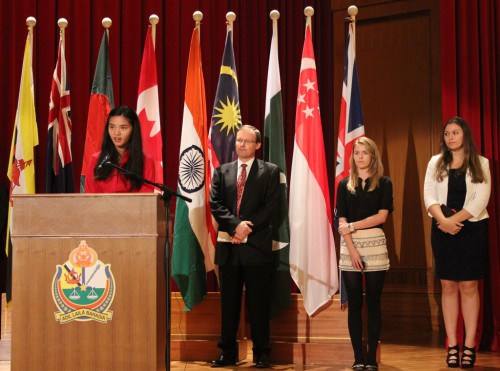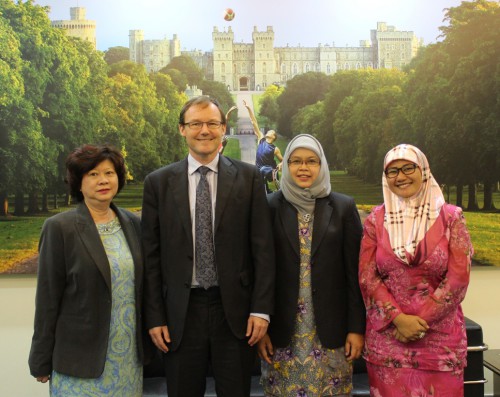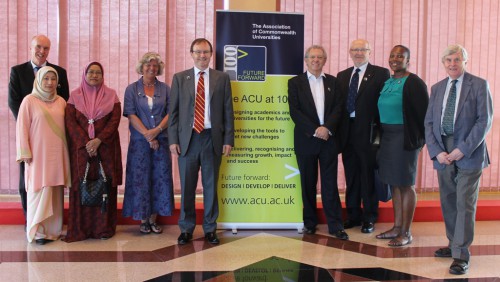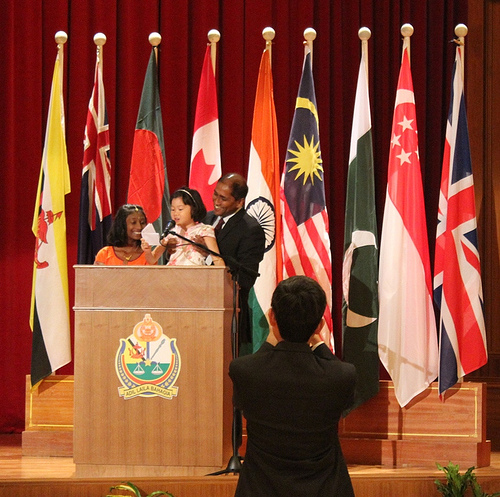18th March 2013 London, UK
Commonwealth – the world’s first social network?
Practise what you preach, we are always told. With my Australian colleague, I had invited six other High Commissioners in Brunei to answer the question “What does the Commonwealth mean to you?” – so I was going to have to come up with an answer of my own. I’ll tell you what it was in a second.
First, I must record my thanks to Pehin Speaker and his staff – on behalf of everyone who attended our Commonwealth Day Reception on 11 March. It is a happy coincidence that Brunei’s Legislative Council tends to be in session on the second Monday in March – which is “Commonwealth Day”. And it was logical that the UK and Australia should approach Pehin Speaker to be our Guest of Honour. But the generosity of his response was overwhelming. At their busiest time of year, the Legislative Council welcomed us into their Banqueting Hall, to stage a complex event involving diplomats, senior officials, teachers and young people, as well as “LegCo” Members.



You can view the rest of the photos and newspaper coverage from our Commonwealth Day 2013 event here: UKinBrunei Flickr, Borneo Bulletin, Brunei Times
In Brunei the Legislative Council is widely referred to as “LegCo”. That affectionate shorthand is already a good sign. It set the High Commissioners thinking. We concluded that “making our institutions accessible to the young” was a highest common factor in the Commonwealth. From there it was only a short step to including young people in the ceremony. We invited students from each Commonwealth country represented in Brunei and from the host nation to share with us their thoughts about the Commonwealth.
What we got was a mosaic of personal impressions – some focussed on particular strands of Commonwealth activity, like the Commonwealth Games, or Technical Cooperation – the way the Commonwealth shares expertise and resources when one of its members is facing a special challenge. Or perhaps I mean a “Venn Diagram”, because each of these personal accounts overlapped with each other at one point or another, and ended up depicting an organisation made up of very different countries and cultures, which nevertheless had important things in common.
Those are its values which – as the Australian High Commissioner reminded us – had been collected together into a Charter which that very day was being signed by Her Majesty the Queen at a ceremony in London. I had the honour of reading out Her Majesty’s Commonwealth Day message. Our event – and the enthusiastic participation in it of Brunei Darussalam – helped ensure that the Commonwealth’s celebration of its new Charter was marked here in Bandar.
Later in the week – Commonwealth Week – I had a chance to meet a young Bruneian who had been at the party in London, meeting Her Majesty, Prince Philip and youth leaders from many Commonwealth countries. Fatin Arifin had been invited by the Secretariat because of her talent at networking, which had produced the alliance of young entrepreneurs in Asian Commonwealth countries known as CAAYE. At the same time, I met two senior, professional Bruneian women who were off to the next Commonwealth networking event, the CSCLeaders forum – in London, Oxford or Glasgow, and then to India and South Africa. I began to feel a bit dizzy with all this networking.

To complete last week’s networking extravaganza, Saturday saw a visit to Brunei by the Association of Commonwealth Universities (ACU), whose 2013 Centenary – dubbed “Future Forward” – celebrates one hundred years of joining up universities in Commonwealth countries, to share best practice and become stronger together. UBD has been a member of ACU for many years, and provided a platform for Professor Sir David King (former Chief Scientific Adviser to the British Government) to deliver his centenary lecture on: “Creating a Full-Spectrum Energy Country”. At the same event, the Secretary-General of ACU, Professor John Wood, spoke on the “character” which unites universities across the Commonwealth – a recipe for academic excellence.

Looking back on Commonwealth Week it’s the word “network” which jumps out at me. That’s always been a good description of what the organisation is; but perhaps it is only in the era of social networking and the internet that the Commonwealth can show its full, transformational power. Successful modern networks are distinguished by choice (we opt in), and by the benefits which membership confers on those who play an active part. Last week’s master class in networking conducted by the Commonwealth, with prominent contributions from Bruneian institutions (LegCo and UBD) and individuals (CAAYE, CSCLeaders) reminds us that Brunei is in many respects a model member of the Commonwealth – an organisation it has contributed to generously over the years, and stands to benefit from even more substantively in the years ahead.
So how did I answer that question “What does the Commonwealth mean to me?” at the LegCo reception? My task was not made easier by the show-stealing performance of a tiny Singaporean girl, who had to be held up to the microphone by her High Commissioner, and whose feisty soundbite about the Commonwealth nearly brought the house down.

I felt a bit intimidate by all those young people in the room, who were so much more network-savvy than I am myself. But I also felt reassured. The future of the Commonwealth is in the hands of a generation who know how to get the best out of it; and to ensure that it continues to stay relevant and adaptable.
So that’s my definition of the Commonwealth: a “resilient network”, strong enough to withstand all the shocks which the 21st Century will undoubtedly throw at it, because it is held together by the choices, instincts and values of the people it serves.